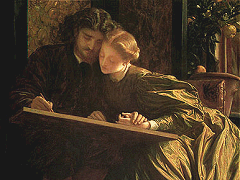 |
Helena:
"That I should love a bright particular star
And think to wed it, he is so above me:
In his bright radiance and collateral light
Must I be comforted, not in his sphere.
The ambition in my love thus plagues itself:
The hind that would be mated by the lion
Must die for love. 'Twas pretty, though plague,
To see him every hour; to sit and draw
His arched brows, his hawking eye, his curls,
In our heart's table; heart too capable
Of every line and trick of his sweet favour:
But now he's gone, and my idolatrous fancy
Must sanctify his reliques."
Helena, to the Countess:
"I love your son.
My friends were poor, but honest; so's my love:
Be not offended; for it hurts not him
That he is loved of me: I follow him not
By any token of presumptuous suit;
Nor would I have him till I do deserve him;
Yet never know how that desert should be.
I know I love in vain, strive against hope;
Yet in this captious and intenible sieve
I still pour in the waters of my love
And lack not to lose still: thus, Indian-like,
Religious in mine error, I adore
The sun, that looks upon his worshipper,
But knows of him no more."
Helena:
"To each of you one fair and virtuous mistress
Fall, when Love please! Marry, to each,
but one!" |
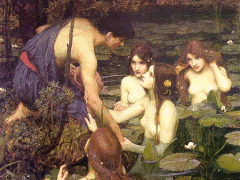 |
Silvius:
"O, thou didst then ne'er love so heartily!
If thou remember'st not the slightest folly
That ever love did make thee run into,
Thou hast not loved:
Or if thou hast not sat as I do now,
Wearying thy hearer in thy mistress' praise,
Thou hast not loved:
Or if thou hast not broke from company
Abruptly, as my passion now makes me,
Thou hast not loved.
O Phebe, Phebe, Phebe!"
Rosalind:
"But are you so much in love as your rhymes speak?"
Orlando:
"Neither rhyme nor reason can express how much."
Rosalind:
"The sight of lovers feedeth those in love."
Phebe:
"Dead Shepherd, now I find thy saw of might,
'Who ever loved that loved not at first sight?'" |
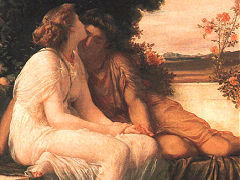 |
Claudio:
"Friendship is constant in all other things
Save in the office and affairs of love:
Therefore, all hearts in love use their own tongues;
Let every eye negotiate for itself
And trust no agent; for beauty is a witch
Against whose charms faith melteth into blood."
Benedick:
"I do much wonder that one man, seeing how much
another man is a fool when he dedicates his
behaviors to love, will, after he hath laughed
at
such shallow follies in others, become the argument
of his own scorn by failing in love...
May I be so converted and see with
these eyes? I cannot tell; I think not: I will
not
be sworn, but love may transform me to an oyster;
but
I'll take my oath on it, till he have made an
oyster
of me, he shall never make me such a fool."
Beatrice:
Contempt, farewell! and maiden pride, adieu!
No glory lives behind the back of such.
And, Benedick, love on; I will requite thee,
Taming my wild heart to thy loving hand:
If thou dost love, my kindness shall incite thee
To bind our loves up in a holy band."
Beatrice:
"You have stayed me in a happy hour:
I was about to protest I loved you."
Benedick:
"And do it with all thy heart."
Beatrice:
"I love you with so much of my heart
That none is left to protest." |
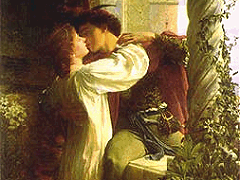 |
Romeo:
"Love is a smoke raised with the fume of sighs;
Being purged, a fire sparkling in lovers' eyes;
Being vex'd a sea nourish'd with lovers' tears:
What is it else? a madness most discreet,
A choking gall and a preserving sweet."
Romeo:
"The all-seeing sun
Ne'er saw her match since first the world begun."
Romeo:
"If I profane with my unworthiest hand
This holy shrine, the gentle fine is this:
My lips, two blushing pilgrims, ready stand
To smooth that rough touch with a tender kiss."
Juliet:
"Good pilgrim, you do wrong your hand too much,
Which mannerly devotion shows in this;
For saints have hands that pilgrims' hands do
touch,
And palm to palm is holy palmers' kiss."
Romeo:
"Have not saints lips, and holy palmers too?"
Juliet:
"Ay, pilgrim, lips that they must use in prayer."
Romeo:
"O, then, dear saint, let lips do what hands
do;
They pray, grant thou, lest faith turn to despair."
Juliet:
"Saints do not move, though grant for prayers'
sake."
Romeo:
"Then move not, while my prayer's effect I take.
Thus from my lips, by yours, my sin is purged."
Juliet:
"Then have my lips the sin that they have took."
Romeo:
"Sin from thy lips? O trespass sweetly urged!
Give me my sin again."
Romeo:
"It is my lady, O, it is my love!
O, that she knew she were!"
Romeo:
"Two of the fairest stars in all the heaven,
Having some business, do entreat her eyes
To twinkle in their spheres till they return.
What if her eyes were there, they in her head?
The brightness of her cheek would shame those
stars,
As daylight doth a lamp; her eyes in heaven
Would through the airy region stream so bright
That birds would sing and think it were not night."
Juliet:
"This bud of love, by summer's ripening breath,
May prove a beauteous flower when next we meet.
Good night, good night! as sweet repose and rest
Come to thy heart as that within my breast!"
Juliet:
"My bounty is as boundless as the sea,
My love as deep; the more I give to thee,
The more I have, for both are infinite."
Romeo:
"I would I were thy bird."
Juliet:
"Sweet, so would I:
Yet I should kill thee with much cherishing."
Juliet:
"Give me my Romeo; and, when he shall die,
Take him and cut him out in little stars,
And he will make the face of heaven so fine
That all the world will be in love with night
And pay no worship to the garish sun.
O, I have bought the mansion of a love,
But not possess'd it, and, though I am sold,
Not yet enjoy'd: so tedious is this day
As is the night before some festival
To an impatient child that hath new robes
And may not wear them."
Romeo:
"Ah me! How sweet is love itself possess'd,
When but love's shadows are so rich in joy!"
Prince:
"See, what a scourge is laid upon your hate,
That heaven finds means to kill your joys with
love." |
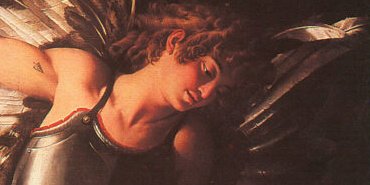





![]() Go to the top of this page.
Go to the top of this page.
![]() Return
to Sweet Home.
Return
to Sweet Home.
![]() "Heavenly
Love Conquering Earthly Love," by Giovanni
Baglione, "The Painter's Honeymoon," and "Acme and Septimius," by Frederic,
Lord Leighton, and "Romeo and Juliet"' by Sir Frank Dicksee, courtesy
of CGFA.
"Heavenly
Love Conquering Earthly Love," by Giovanni
Baglione, "The Painter's Honeymoon," and "Acme and Septimius," by Frederic,
Lord Leighton, and "Romeo and Juliet"' by Sir Frank Dicksee, courtesy
of CGFA.
![]() "Hylas and the Nymphs," by John
Waterhouse, courtesy of Brian
Yoder's Web Gallery.
"Hylas and the Nymphs," by John
Waterhouse, courtesy of Brian
Yoder's Web Gallery.
![]() Contact the author of this page by emailing whatslove@bigfoot.com
Contact the author of this page by emailing whatslove@bigfoot.com
![]() Thank
you for visiting!
Thank
you for visiting!